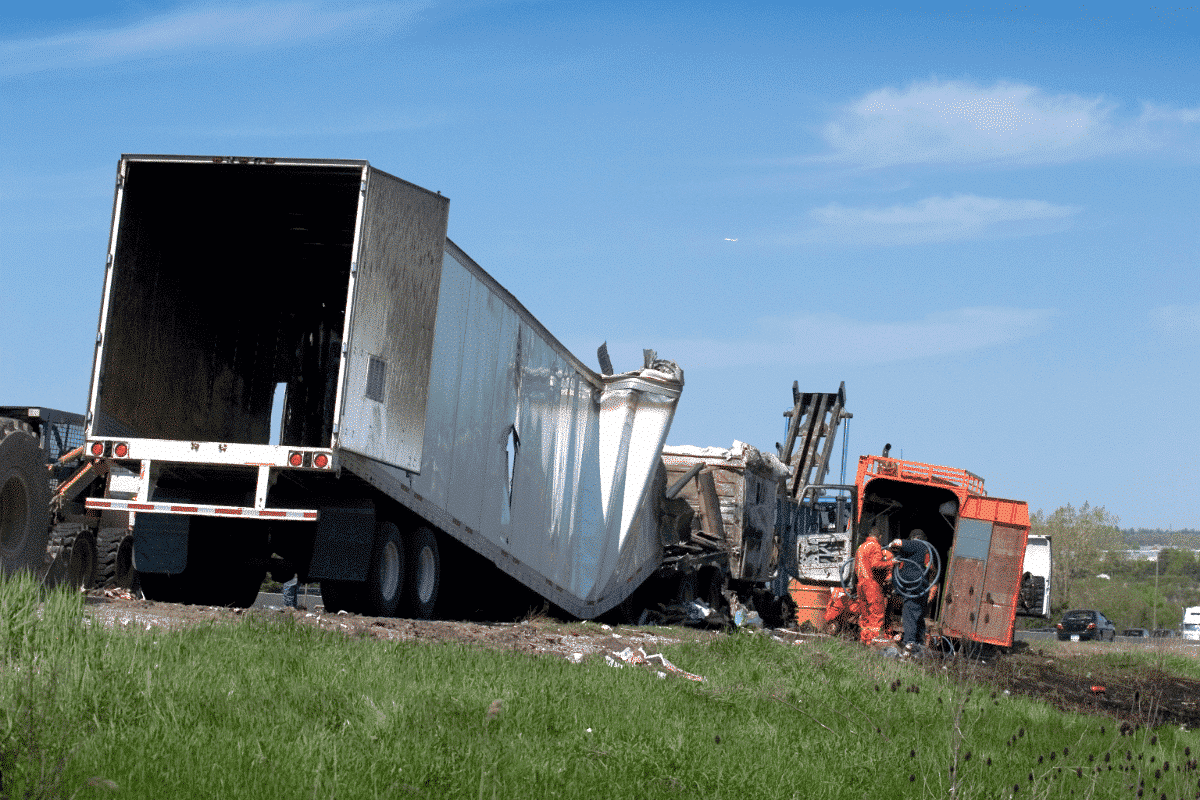
If you were injured in a truck accident, you might first look to the truck driver for compensation. However, truck accidents often involve more than one at-fault party, including truck drivers, trucking companies, cargo loaders, maintenance crews, equipment manufacturers, and other road users. Our West Virginia truck accident attorneys are ready to pursue all sources of compensation on your behalf. Contact us today to schedule a free, no-obligation consultation.
How Do You Determine Liability in a Truck Accident?
It may seem obvious that truck drivers are first in line to compensate you if they cause an accident in which you are injured. However, though an at-fault truck driver may certainly be on the hook, many other parties may also share fault and can be held liable for damages. This section explores possible sources of liability in a truck accident.
1. Truck Drivers
Again, truck drivers are the most obvious place to start when evaluating liability in truck accidents. Just like other drivers, truckers must obey the rules of the road. Failure to do so may lead to liability if it causes an accident. Some ways a truck driver may be held liable for an accident include:
- Speeding: Because of their enormous weight, commercial trucks have a much longer stopping distance. The faster a truck is traveling, the longer it will take to stop. Therefore, to avoid accidents, truckers must take extra care to avoid speeding.
- Distracted driving: Distractions in trucks range from cell phones and radios to intercoms and GPS navigators. In all cases, it is important that truck drivers not let these devices take their eyes off the road.
- Driving while intoxicated: As we all know, driving while intoxicated is extremely dangerous. It is even more so when the intoxicated motorist is operating a large commercial truck.
- Lack of Training: Inexperienced or poorly trained truckers are more likely to make dangerous driver errors. Truck companies sometimes cut corners by hiring inexperienced drivers or not providing them with sufficient training.
- Driver fatigue: Truck drivers are responsible for transporting goods across the country, which often means that they operate their trucks for many hours at a time. If they do not take time to rest, driver fatigue can set in, endangering both the driver and any other road users they encounter. To reduce the risk of truck accidents caused by driver fatigue, the Federal Motor Carrier Safety Administration has strict hours-of-service limits for truck drivers operating across state lines.
2. Trucking Companies
A skilled truck accident attorney will strive to gather evidence to prove the trucking company is also liable for damages after a collision. Trucking companies may be at fault for accidents when they fail to:
- Properly screen their drivers during the hiring process
- Provide adequate training for their drivers
- Regularly inspect their trucks
- Stay on top of truck maintenance and repairs
- Obey safety regulations and ensure their drivers do the same
These are just a few ways a trucking company may be held liable for an accident involving one of their drivers. Warner Law Offices, PLLC, has the skill and experience needed to handle even the most complex truck accident cases.
3. Trailer or Cargo Loaders
Cargo carried by commercial trucks such as a Fedex delivery truck can cause accidents when not properly balanced or secured. For example, if heavy cargo is not evenly distributed, it can leave the truck at risk of tipping over, jackknifing, or swaying into another lane of traffic. All of these scenarios can result in a catastrophic accident.
4. Truck Parts and Equipment Manufacturers and Distributors
If truck parts or equipment are defective, the manufacturers and distributors can be on the hook for product liability. Cases involving this kind of liability can be particularly complex and require the attention of an experienced attorney.
5. Other Drivers
Of course, any negligent road user can be held liable if their failure to use reasonable care results in an accident. For example, suppose an impatient driver in a car carelessly changes lanes by suddenly crossing into a lane occupied by a large semi-truck. The truck driver brakes suddenly, losing control of their vehicle. Anyone injured in the ensuing accident, including the truck driver, can sue the impatient motorist for compensation.
Vicarious Liability for Truck Drivers
In many cases, employers can be held responsible for the actions of their employees through the legal doctrine of respondeat superior. To prove this kind of liability, truck accident victims must prove that the trucker was operating in the “course and scope” of their employment with their trucking company at the time of the accident. If this can be shown, the trucking company may take on responsibility for the driver’s negligence that gave rise to the accident.
How Do You Prove Negligence?
Negligence is the cornerstone of most personal injury cases. To win a truck accident case based on this legal theory, plaintiffs must prove four elements:
- Duty: First, they must show the trucker or another party had a duty to take reasonable care to avoid harming others. For example, truck drivers have a duty to operate their trucks safely.
- Breach of Duty: Second, they must prove that the truck driver failed to uphold that duty. For example, a truck driver who failed to check their blind spots before changing lanes likely breached their duty to take reasonable care.
- Damages: Next, plaintiffs must show that they suffered an injury or loss.
- Causation: Finally, plaintiffs must prove that their injury or loss was caused by the truck defendant’s breach.
As an alternative, plaintiffs can also rely on the legal doctrine of negligence per se. This is a specialized form of negligence that spares plaintiffs from proving the traditional elements listed above. Instead, the doctrine of negligence per se simply requires proof that a trucker violated a law designed to protect against the type of accident or harm caused by their conduct.
For example, laws against running red lights and driving while intoxicated are meant to keep roads safe. If a trucker causes an accident by violating these rules, they may be held negligent per se.
What Kind of Evidence Do I Need to Win a Truck Accident Lawsuit?
No matter which form of negligence your case hinges on, you will need evidence to substantiate your claim. A skilled attorney at Warner Law Offices, PLLC, can gather evidence to build the strongest possible case on your behalf. Among other things, it may include things like:
- Accident Report: The officers dispatched to the scene of the accident will prepare a detailed accident report. The information in this report carries heavy weight in court because of their presumed objectivity. Objective or not, it is important to take the information contained in accident reports into serious consideration.
- Photographic Evidence: They say a picture is worth a thousand words. Photos from the scene of the accident, vehicle damage, and your injuries can help determine how the accident unfolded. If you are able, it is a good idea to pull out your phone and document the scene yourself.
- Video Evidence: In many cases, there may be footage available from nearby security, traffic, or dash cams. This footage may reveal what caused the accident and who is at fault.
- Medical Records: Medical treatment and billing records are necessary to prove the extent and severity of your injuries. The cost of medical care, treatments, medication, rehabilitation, and more are all recoverable damages in a truck accident claim.
- Testimony: If there were any accident witnesses, their statements could significantly impact the strength of your case. Further, testimony from experts, such as traffic engineers and accident reconstruction specialists, can turn the tide of a case.


Why Hire a West Virginia Truck Accident Lawyer?
When you hire an experienced West Virginia truck accident attorney from Warner Law Offices, PLLC, you can rest assured that your case will be skillfully handled from start to finish. Handling a truck accident case alone can be complex and overwhelming, especially when dealing with painful injuries and a lengthy recovery.
Because of the high stakes involved in many truck accidents, defendants in these cases can be particularly combative. We know how to push back. We can also handle difficult insurers when they insist on a lowball settlement offer.
Our attorneys will get to work collecting evidence, interviewing witnesses, negotiating with insurance companies, and building a solid case that puts you in the best position possible to receive a favorable settlement. If a fair out-of-court settlement cannot be reached, we have the skills and resources to argue your case in court.
Warner Law Offices, PLLC, Truck Accident Settlements
Our legal team proudly helps truck accident victims and their families throughout the state fight for the full and fair compensation they deserve. Our successful results reflect our dedication to our clients and commitment to securing justice on their behalf. You can explore our case results.
Why Choose Warner Law Offices, PLLC?
At Warner Law Offices, PLLC, we offer compassionate and personalized representation for truck accident victims. We have decades of combined experience in personal injury law and are dedicated to helping our clients fight for their right to compensation. Contact our team today to schedule a free, no-obligation consultation with our truck accident attorneys.



